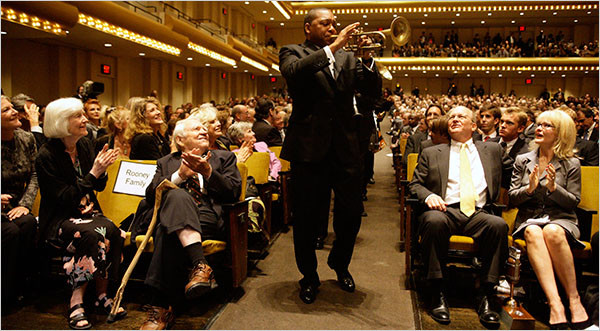Remembering Walter Cronkite and What He Stood For

Wynton Marsalis, performing at the Avery Fisher Hall service for Walter Cronkite.
Before a hall filled with his friends, protégés and occasional competitors, the late CBS anchorman Walter Cronkite was remembered at a memorial service on Wednesday for upholding a journalistic standard that is, President Obama said, “a little bit harder to find today.”
Calling Mr. Cronkite “the man who chronicled our time,” Mr. Obama was among more than a dozen speakers at the service, at Lincoln Center, one that felt at times like a class reunion for television news.
“I would venture to say there isn’t a person in this room today, in the profession, who wasn’t in some way inspired by Walter Cronkite to go into the media,” said Leslie Moonves, the chief executive of CBS Corporation.
Mr. Cronkite, who anchored “CBS Evening News” through the turbulent 1960s and 1970s, died July 17 at the age of 92. His funeral was held in Manhattan on July 23.
The audience at the 2 1/2-hour service nearly filled the orchestra and first tier at Avery Fisher Hall. Projected above the stage was a large black and white photograph of Mr. Cronkite.
To a greater extent than the other speakers, Mr. Obama acknowledged the difficulties that now face the journalists who were inspired by Mr. Cronkite decades ago.
Mr. Obama said that too much of the media diet today is filled by the “instant commentary and celebrity gossip and the softer stories that Walter disdained, rather than the hard news and investigative journalism he championed.”
“ ‘What happened today?’ is replaced with ‘Who won today?’ ” Mr. Obama said.
He told the audience, “The simple values Walter Cronkite set out in pursuit of — to seek the truth, to keep us honest, to explore our world the best he could — they are as vital today as they ever were.”
Earlier in the service, a series of prominent speakers and performers praised Mr. Cronkite’s life and career. Howard Stringer, a former president of CBS, said Mr. Cronkite had “codified the word ‘anchorman.’ ” Before his performance, Jimmy Buffett reminisced about Mr. Cronkite’s “Long John Silver tone of voice.” Katie Couric, now the anchor of the evening newscast, said she had been overwhelmed as she sat at lunch three years ago with Mr. Cronkite, “whose very presence had defined the job.” Buzz Aldrin, the Apollo 11 astronaut, spoke about Mr. Cronkite’s coverage of the space race.
“With his usual insight, context and color, he made voyages to the moon very real for the average American,” Mr. Aldrin said.
Mr. Cronkite’s career reflected the power of broadcasting, and the tributes to him came at a time when that power is in some doubt. Former President Bill Clinton, another speaker, said Mr. Cronkite was well aware of the limitations of television news. He recalled that Mr. Cronkite once said, “I did the best I could, but really, I think people should read more newspapers.”
Mr. Clinton chuckled, asking, “Can you imagine anyone else fessing up to that?”
In an increasingly fractured media landscape, the evening newscast that Mr. Cronkite once led now reaches only a fraction of its former audience. But in his remarks, Rick Kaplan, an associate producer for Mr. Cronkite decades ago and now the executive producer of the evening newscast, said he thought Mr. Cronkite would “scoff at those” who think the evening newscasts are “on the way out.”
“He might say there were times that they lost their focus but never their mission, and that is to inform the public,” Mr. Kaplan said.
One of Mr. Cronkite’s grandchildren, Walt, is working as an intern in the Washington bureau of CBS News for the fall semester. The longtime CBS journalist Bob Schieffer said Walt had asked him recently, “What was it like when my grandfather was here?”
“The first thing I told him was, ‘It was fun,’ ” Mr. Schieffer said. “ ‘We all wanted to be here. Your grandfather’s enthusiasm captured us all.’ ”
by Brian Stelter
Source: New York Times
